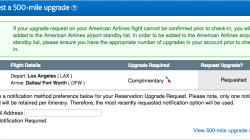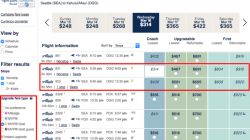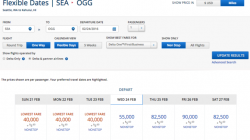I started this post a month ago and then got distracted, so I apologize if it’s not all as fresh in my mind as I had hoped. You might remember before my absence that I wrote a short post on complimentary upgrade rules at different carriers. Several people asked me to clarify how other types of upgrades work and how complimentary upgrades fit into that framework. So I spent this week reviewing four airlines’ policies in more detail.
- Ultimate Guide to Alaska Airlines Upgrade Rules
- Ultimate Guide to United Airlines Upgrade Rules
- Ultimate Guide to American Airlines Upgrade Rules
- Ultimate Guide to Delta Air Lines Upgrade Rules
Today is about how these upgrade policies compare to each other more directly, along with some more opinionated comments. 😉 I think all four airlines — Alaska, American, Delta, and United — have good upgrade policies. The question you need to ask yourself is, “What kind of traveler am I?”
Upgrades for Full Fare Tickets
Delta may be a good choice for the very frequent flyer, especially business travelers who fly alone and with more expensive tickets. Full fare tickets in the Y class are upgraded ahead of all others, even discounted tickets purchased by people with more senior status. Companions are upgraded last, just before travelers from other partner airlines, so the individual business traveler, even with low status, has fewer people in front of him or her.
United, American, and Alaska also prioritize full fare tickets. They do it differently in that you are still upgraded within your elite tier, while Delta processes full fare upgrades first and then looks at status after that for discounted tickets. United, American, and Alaska also make “instant” full fare upgrades a little easier. Alaska has five eligible fare classes for its top and middle tiers and three for its lowest tier. United has two or three eligible fares depending on your status. American has two fares. Delta has only one.
Upgrades on Award Tickets
Delta and United both provide upgrades on award tickets. United does require that you get a certain credit card, but other than this the two airlines will prioritize you at the end of all other paid fares — meaning you’ll be last in line within your own elite tier but ahead of other elite tiers. (Also know that Delta excludes Silver Medallion members from this upgrade type.)
One of the most common questions I get is how to upgrade an award ticket. The answer, except for these two cases, is that you can’t. Book an award ticket in the cabin you want to fly. If you already booked coach, this means you may need to rebook your award in business or first class. Some airlines will waive the change fee as long as your new award is on the same flight and just involves a change in cabin class.
Using Miles to Upgrade
Again, this is an area with some huge disparities. Alaska and Delta have no co-pays for upgrades that use miles but only because they either don’t have very expensive flights (Alaska) or charge a lot of miles and have restrictions on when they clear (Delta). American is in between. For the most part they only allow upgrades on their own flights and have reasonable co-pays, but upgrades on more expensive tickets issued by British Airways and Iberia are also possible.
United has the most flexible policy. Upgrades are possible on any route you can imagine, including most routes operated by Star Alliance partners. Searching for upgrade inventory while still booking the flight is easy and transparent. The question is cost. Co-pays are expensive and highly variable. Upgrades on partners require a full fare ticket, which is probably more expensive than a discounted business class fare, but a large list of partners are eligible.
Bottom line: while you can nearly always upgrade using miles on United, it’s not always a good value.
I personally do not use miles to upgrade tickets. I’d rather book an award in business class to start with. I know many people who feel differently and use miles primarily for upgrades.
Complimentary Elite Upgrades
All four carriers rank upgrades by time of request, but the importance of this factor varies. With United and Delta, elite status and fare class are taken into account first. My guess is that time of request is a fairly unimportant factor, more of a tie-breaker than anything else. Money talks, and if you buy more expensive last-minute fares than this policy will help you.
Alaska and American give much higher priority to time of request since this is pretty much the only factor they consider besides elite status. Fare class barely matters. Both carriers do offer upgrades for full fare tickets, but American only grants priority to its top fare class and Alaska does not roll them into the complimentary elite upgrade list. People who book flights in advance — even cheap ones — will prefer American and Alaska’s policy.
Companion Upgrades
In most cases, companion upgrades clear at the same time as the primary traveler. With United there is an occasional advantage to splitting the itinerary since the automated system may skip over to the next single traveler. However, the order of the upgrade queue does not actually change. Companion upgrades at American are at a greater disadvantage as you must purchase additional 500-mile upgrades for your companion before departure.
I consider Delta the worst because it drags down the primary traveler to the same level as the companion. If the companion has no status, that could suck for both of you.
You can split an itinerary (like with United) to improve your chances. However, it is more likely than on United that Delta will upgrade one person and not the other. Why? When split an itinerary on United, both passengers retain the higher status are are merely upgraded in sequence rather than together. When you split an itinerary on Delta, the companion remains at the bottom of the queue, but the primary traveler returns to his or her normal priority.




